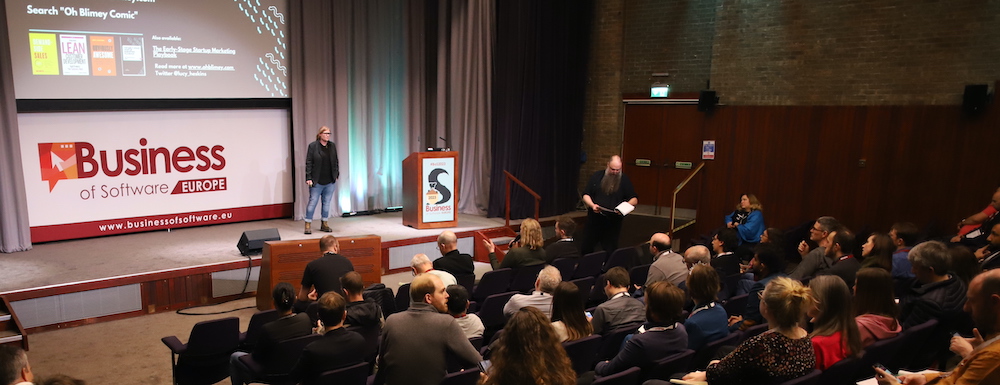You know those people have one million pictures of their dog in their phone’s camera album?
Well, that’s me. However, in my phone’s album, the one million pictures are of me attending Business of Software events.
I’ve got pictures of speakers, of the lunch, of Mark walking around introducing people, of speaker’s slides, of the venue the BoS team has chosen to hold the event. You name it, I look like I’m obsessed. There are so many pictures.
And this year’s BoS in Cambridge only added to this growing collection.
BoS, Cambridge, was my second in-person event. The first (BoS USA) involved me flying to Boston, US, to watch some amazing speakers and experience what the BoS community really was all about. This one – on “home soil” – allowed me to continue the fun and play a part in contributing to the community.
What I enjoy about BoS is that it’s a single-track event. It provides attendees with a unique experience to listen to some of the most interesting speakers when it comes to building software businesses. You don’t have to pick a speaker, it’s been curated in a way that you get to watch people who take you on a journey of growing your business. It’s thoughtful.
Unlike other events I’ve attended, it’s clear to me they put a lot of effort into who they choose to speak to, ensuring the speakers are as diverse as their audience and the customers who buy their products.
But this year for me was different.

This year, I was given the opportunity to present my own talk to the BoS community.
My talk was on building an effective go-to-market strategy. My aim was to get people to realise that go-to-market isn’t just about the launch; it’s the sum of a number of parts of the business working together, one where the product takes centre stage.
We’d had a day and a half of great talks – covering everything from mistakes founders had made, and website messaging tear-downs, right through to a masterclass in Jobs to be Done – and I was fortunate in my talk to draw upon many of the lessons previous sessions had made, and to continue to thread the message that sales, marketing, product, and development are all connected. They all need to work together to get maximum impact.
Interestingly, it was the engagement from the audience and the questions they asked me afterwards that really made it for me. That’s where the fun really kicked off for me.
When is the right time to use a consultant?
What’s the difference between go-to-market for startups and a marketing strategy?
What’s a founder-led strategy to follow?
These were just some of the questions from the audience who were engaged, listened, and wanted to learn more.
This last part really sums up BoS for me: It’s about becoming part of a community of inquisitive, engaging, thoughtful software and product folk who genuinely care about making their products better.
Lucy Heskins
Director, Oh Blimey
Oh Blimey